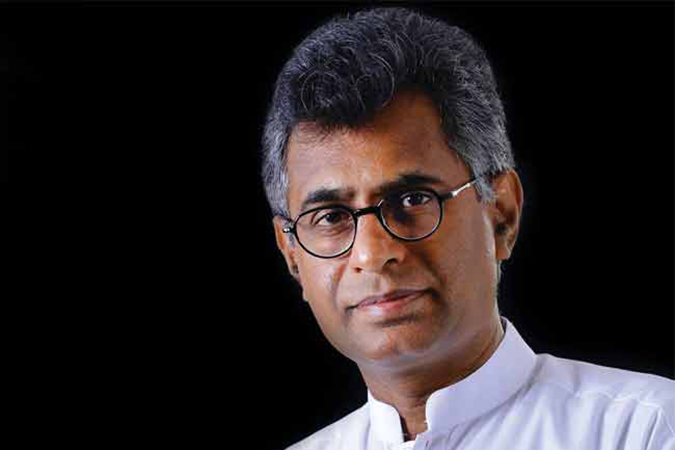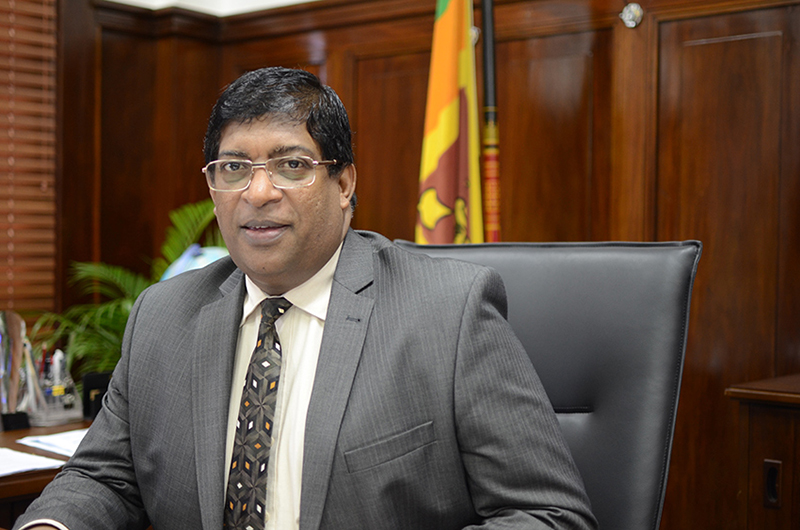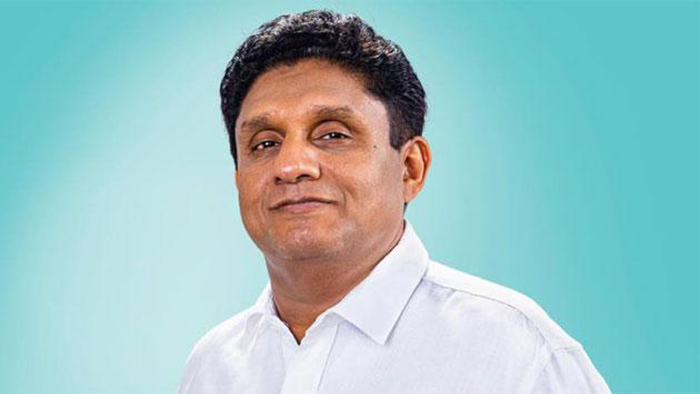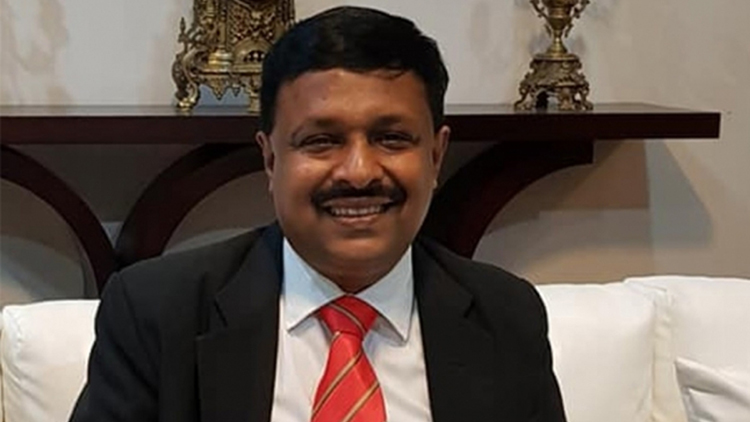News
Ranawaka: It’s possible to prosecute those who bankrupted country

by Saman Indrajith
Leader of the 43 Brigade and independent MP Patali Champika Ranawaka has called for legal action against politicians and officials responsible for the country’s bankruptcy.Speaking at a meeting with the Executive Committee members of the Sri Lanka Parliamentary Journalists’ Association, at the Solis Banquet Hall, in Pitakotte, last week, Ranawaka said that legal action could be instituted under the provisions of the Monetary Law Act of 1950 against those who bankrupted the country.
“In addition, there are provisions in the Fiscal Responsibility Management Act that could hold filing cases against the secretaries to the Ministry of Finance and Treasury Secretaries who had violated these laws and failed to execute their responsibilities. There are laws that put limits in obtaining loans. These officials cannot place the blame only on the politicians. They too should be brought before the law. They did the very same as Sakviti Ranasinghe who asked the people to deposit money, promising 25 percent interest. Sakviti could not pay and declared bankruptcy. He was put in jail for 22 years but those who ruined the national economy have not been punished yet. What our Central Bank and the governments had been doing was very similar to the conduct of Sakvithi.
“We took loans. We invested some in development and lost the rest due to waste and corruption,” Ranawaka said, noting that Sri Lanka had been obtaining loans since 1954. “There is nothing wrong with taking loans as long as they can be settled. We used to obtain loans on very low interests from other countries and international bodies such as JICA, KOICA and World Bank. After Sri Lanka was declared a middle income earning country, we could not obtain loans for such low interests. Thereafter we had to go to the market to obtain loans for higher interests such as 8-10 percent to settle in five to 10 years. We obtained them in the form of International sovereign bonds (ISBs) and Sri Lanka Development Bonds (SLDBs). The ISBs and SLDBs were around four percent of GDP. Interest for the loans taken from the World Bank and Asian Development Bank was around 0.1 to 0.2 percent. For example, the LRT project from the JICA loan was less than 0.1 percent. It had a grace period of 12 years and further 40 years to settle completely. Instead of such loans, we opted for commercial loans which doubled in 10 years if we do not pay. What we are facing today is a crisis because of commercial loans.”
Ranawaka said that the Gotabaya Rajapaksa government had made a large number of blunders, which had ruined the economy. “He gave massive tax reliefs. He wanted to remove the Super-gain tax introduced by the Yahapalana government. It was a 25 percent tax imposed on 62 leading companies, including those of Dhammika Perera, who earned more than one billion rupees in profits. That tax brought in 56 billion rupees to government coffers. These businessmen opposed the tax and promised that they could use that 56 billion rupees for more projects that could generate around Rs 250 billions, following liberal economic policies. The Rakapaksas, who came to power promising to promote socialist economic policies, removed that tax. They brought down VAT and removed limits of income tax by upping the threshold to three million rupees. The result was a drop of those who paid income taxes from 1.5 million to 400,000. Their tax revisions resulted in a drop of around 40 percent of national income. The rating institutes, including the Moody’s, Fitch Ratings, the S&P, dropped us from B grade to C grade. That was one of the main reasons for our inability to obtain loans.
“It is true that the Yahapalana government obtained 12 billion US dollar loans. The then Governor of the Central Bank, Indrajit Coomaraswamy, went to the international market, when the interests were very low, and obtained loans to raise around eight billion US Dollars. Of that amount, we left UDS 7.2 billion as reserves. This government spent USD 5.5 billion during the corona pandemic period to keep the rupee value against dollars. That attempt was not successful because in the open market a dollar was around Rs 330-380. They not only failed to achieve the desired results but also lost the reserves, too. Corresponding to these, remittances from foreign countries dropped from USD 600 million a month to USD 250 million as Lankan expats opted to Undiyal. In the meantime, the government kept on spending on highways, carpeting 100,000 roads, building 13,000 houses and developing 100 towns. To cover up the loss, they printed more money. Total the value of the rupees in circulation was only 1,500 billion. Now, after the cash printing spree, we have 4,500 billion rupees in circulation. That is the main reason for the increasing prices of goods and inflation.”
News
Ravi demands full disclosure on Lanka’s usable reserves, flags forex leakages

Opposition MP Ravi Karunanayake on Wednesday called for an urgent government statement to Parliament on the integrity and usability of Sri Lanka’s Gross Official Reserves (GOR), raising concerns over foreign exchange leakages and regulatory consistency under the Foreign Exchange Act No. 12 of 2017.
Raising the issue under Standing Order 27 (i), Karunanayake urged the Government to provide a comprehensive disclosure on the composition, encumbrances and deployability of the country’s reserves, as well as on the Central Bank’s oversight of foreign currency transactions.
“Reserve credibility depends not merely on headline numbers, but on transparency, enforceability and consistency in regulation,” the MP told the House.
He sought clarification on the latest reported GOR figure and the net usable reserves after excluding encumbered assets, swaps and pledged balances. He also requested details of annual revenue earned on reserves from 2023 to 2025.
Following are the questions raised by MP Karunanayake:
1. What is the latest reported GOR figure, and what is the net usable reserve after excluding encumbered assets, swaps, and pledged balances? What is the revenue earned on are GOR 23-25 per year?
2. Provide a separate and detailed breakdown of GOR, including: (a) Monetary gold (quantity and valuation basis) is it real gold or gold paper? (b) Foreign currency assets by major currency and instrument; (c) SDR holdings; (d) IMF reserve position; (e) Foreign currency swaps, specifying counterparty type, principal amount, tenure, maturity profile, and all-in cost; (f) Domestic swaps, specifying amount, tenure, rollover terms, collateralisation, and effective cost.
3. Of the total reserves reported, how much is encumbered, swap-backed, or otherwise not immediately deployable for debt servicing or currency stabilisation?
4. What SLR spread, fee, or margin does the Central bank apply when buying or selling USD to the Government for reserve accumulation and external debt servicing and what total profit or gain has the C.bank realised from such transactions during the past three financial years? Advice per year.
5. Is the Central Bank subject to continuous and statutory audit by the Auditor General? If so, will the Government table the most recent audit report, specifying audit scope, sample size, reserve confirmations, swap verification and gold custody validation?
6. What triggered the recent circular warning domestic institutions on foreign currency transactions?
7. Has the C.bank quantified foreign exchange and tax revenue losses resulting from Sri Lanka-based businesses routing credit card and commercial payments through overseas payment gateways?
8. If domestic entities are regulated strictly, why has a binding circular not been issued against noncompliant business entities using foreign payment gateway arrangements that divert foreign exchange outside Sri Lanka’s regulated banking system?
The government asked for two weeks’ time to respond to the queries.
by Saman Indrajith
News
Sajith exposes highly questionable coal imports from South Africa in 25 vessels; calls for independent probe

Opposition Leader Sajith Premadasa yesterday alleged in Parliament that eight recently imported coal shipments were substandard and called for an independent probe into the matter.Speaking in the House, Premadasa said Sri Lanka typically requires 36–38 coal shipments annually. While 11 Russian shipments received so far had raised no concerns, he claimed that 25 vessels ordered from South Africa under a new tender were facing quality issues.
He cited combustion reports from the Norochcholai Coal Power Plant showing that the eight shipments already received under the new tender failed to generate the expected 300 megawatts per unit. According to the MP, the outputs were: 285 MW, 290 MW, 260 MW, 295 MW, 285 MW, 270 MW, 275 MW, and 255 MW.
“These are scientific data generated automatically through boiler combustion reports that cannot be altered,” Premadasa said, asserting that the figures indicate the coal supplied was below required standards.
He warned that low-quality coal could increase fuel consumption, raise operational costs, and damage equipment. Any shortfall in power generation, he said, would necessitate additional coal imports or greater reliance on diesel power, ultimately driving up electricity tariffs for consumers.
“The loss will have to be borne by the electricity consumer,” Premadasa said, urging the government to clarify whether the shipments met required specifications.
He also criticized delays and changes in tender requirements, alleging that supplier eligibility criteria had been relaxed to allow non-standard providers.
by Saman Indrajith
News
Ex-TRCSL Chairman Palpita enlarged on bail

Former Mass Media Ministry Secretary and former Telecommunications Regulatory Commission of Sri Lanka (TRCSL) Chairman Anusha Palpita was yesterday released on bail by the Colombo Chief Magistrate’s Court.Colombo Chief Magistrate Asanga S. Bodaragama granted bail after considering submissions made by officials of the Bribery Commission and counsel for the defence.
The Magistrate ordered the suspect’s release on two personal surety bonds of Rs. 5 million each and imposed a foreign travel ban.
When the case was taken up, Bribery Commission officials informed court that a report had been called regarding alleged investments made by the suspect in the stock market. They sought a further date to present facts pertaining to those reports.
Appearing for the suspect, Attorney-at-Law Kanchana Ratwatte submitted that his client had been in remand custody for nearly a month and was prepared to extend full cooperation to investigators. He moved for bail on that basis.
After hearing both sides, the Magistrate observed that no reasonable grounds had been placed before court to further remand the suspect and ordered his release on bail. The case was fixed for 29 May.
Palpita was arrested on 23 January in connection with an investigation initiated by the Bribery Commission over the alleged failure to disclose the source of assets amounting to Rs. 46 million.
The Commission stated that he had arrived at its office on the day of his arrest to give a statement and was taken into custody thereafter.
He was arrested on allegations of amassing assets and property disproportionate to his declared income during a specified period, following a probe into wealth allegedly accumulated beyond his lawful earnings.
-

 Life style6 days ago
Life style6 days agoMarriot new GM Suranga
-

 Business5 days ago
Business5 days agoMinistry of Brands to launch Sri Lanka’s first off-price retail destination
-

 Features6 days ago
Features6 days agoMonks’ march, in America and Sri Lanka
-

 Features6 days ago
Features6 days agoThe Rise of Takaichi
-

 Features6 days ago
Features6 days agoWetlands of Sri Lanka:
-

 News6 days ago
News6 days agoThailand to recruit 10,000 Lankans under new labour pact
-

 News6 days ago
News6 days agoMassive Sangha confab to address alleged injustices against monks
-

 Sports2 days ago
Sports2 days agoOld and new at the SSC, just like Pakistan













